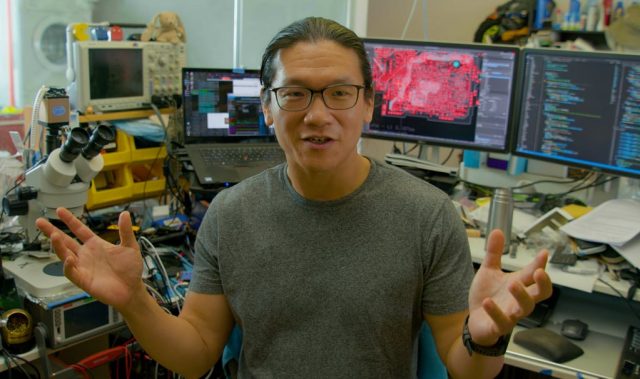
AsianScientist (Apr. 24, 2017) – The cool grip of my assault rifle presses against the palm of my right hand. My index finger hovers above the safety catch, just centimeters away from the trigger. I adjust my helmet by nudging it gently with my free hand, then tilt my head slightly so that I am looking through the scope of my weapon. There is nothing to train the crosshair on. Nothing yet, but anytime now…
Two targets appear from behind a mound of sand. I adjust my aim and muscle memory takes over. In one continuous motion I release the safety catch and my finger finds the trigger. I hold my breath and squeeze—the gunshot is deafening and the recoil rams the butt of my weapon deep into my shoulder. The target goes down. A hit! I shift my aim and repeat the process, looking for another bull’s-eye. This time, I miss. I’ve got to make the last four bullets count.
What I’ve just described is a live firing exercise from my recent reservist training in the Singapore Army. Although the bullets I fired were real, rest assured that only dummy targets were riddled with bullet holes at the end of the day. For non-Singaporean readers, you may have heard that every Singaporean male is conscripted and spends two years of his life engaged in full-time national service, be it in the military, the civil defense or the police force. This is followed by ten cycles of reservist training, scheduled once every year.
So why am I bringing up my military service in this month’s column? Well, during last month’s reservist training, I reflected on how being a soldier is actually very much like being a scientist. Here are four reasons why.
- You’re always tired
- You must be appropriately attired
- You get lost sometimes
- You need teamwork to survive
Whether you’re cleaning your rifle after a live firing exercise or just waiting around for the next training activity to start, weariness never seems to be far away when you’re in the army. It could be because waking up before the sun rises just doesn’t agree with your circadian rhythm. Or perhaps it’s the helmet that’s sapping your wakefulness. There’s something about being a soldier that makes you feel tired all the time. I could say the same thing about being a scientist.
Just think about it. When was the last time you found yourself yawning because you had been reading that Nature paper late into the night (for tomorrow’s journal club)? Are your eyelids drooping even as you stare at the blank Word document that’s supposed to be a grant application due in two days? And wait a minute, did somebody say “time-point experiment?” Suffice to say, the mental fatigue scientists experience can rival the physical strain of soldiering.
Soldiers must be appropriately dressed when carrying out different soldiering tasks. In the Singapore Army, the digitized camouflage uniform is affectionately called “the number-four” and is worn with boots for all field activities. Fold up the long sleeves of the number-four and what you get is the “smart-four” attire, typically used during military parades. Then you have the unimaginatively-named “physical training kit” and “admin attire” for—you guessed it—physical training and administrative duties, respectively.
Scientists also have a strict dress code for their daily lab activities. Remember to wear your lab coat and covered shoes! Of course, you should escalate the comprehensiveness of your personal protective equipment according to the hazard level of your experiments—face masks, safety goggles, thermal-insulated gloves, hazmat suits and all.
Navigation should be a breeze for soldiers now that we have Google maps, right? Just whip out your mobile phone, key in your destination and—voila—your path is illuminated! If only it were that easy. During navigation exercises in the army, more often than not you’ll be finding your way around a jungle using only a map, a compass and a pace counter. The most prominent landmark in sight is likely to be “that tree with the bird’s nest fern on it.”
For scientists, experiment protocols are the metaphorical jungles of our profession. Protocol optimization can sometimes feel like heading towards “that tree with the bird’s nest fern in it” and ending up in a swamp. Getting lost can also manifest as the existential crisis of your research project. You scratch your head and wonder “Where do I go from here?”
Camaraderie and esprit de corps are terms that come up pretty often when you’re working in a military environment. Quite unlike the one-man army often depicted in Hollywood movies, being a soldier in real life means working as part of a team. Acting alone will almost certainly get you killed or captured. Like any team, you quickly get to know one another’s strengths and weaknesses, and you compensate for each other’s shortcomings to complete the mission.
In a lab setting, the PI, postdocs, RAs, PhD students and undergraduate interns all need to function as a cohesive unit so that good science can flourish. If there’s an idea that might be worth pursuing, discuss it and be forthcoming with suggestions and constructive criticisms. If there’s a protocol that works, share it with other lab members. If a common experiment reagent is running out, replenish it. Science is difficult enough as it is, so there’s really no need to further hinder its progress with a toxic lab culture.
To end off this column, here’s a shout out to all you scientists with boots on the ground at the frontiers of science. Keep marching on!
This article is from a monthly column called Hacking a PhD. Click here to see the other articles in this series.
———
Copyright: Asian Scientist Magazine; Photo: Pixabay.
Disclaimer: This article does not necessarily reflect the views of AsianScientist or its staff.













